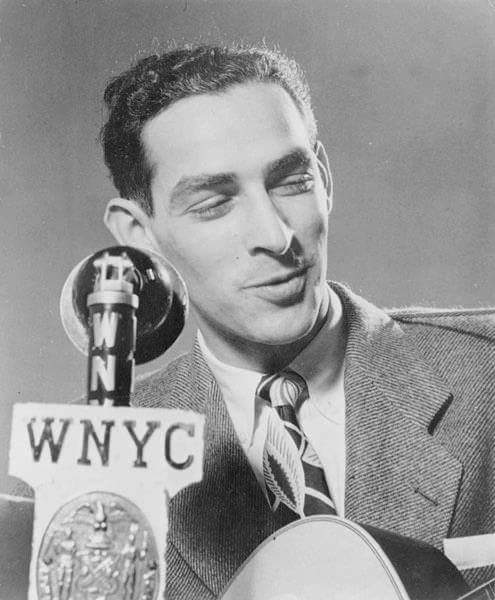BY PAUL DeRIENZO | Last weekend, WNYC broadcaster Oscar Brand celebrated his 69th continuous year on the air with a special edition of his radio program, “Oscar Brand’s Folksong Festival.” The program featured tapes from past broadcasts, showcasing his vast archive of musical guests.
Over the years, Brand provided an outlet to many musicians who might never have been heard and many who became famous. Highlights include Arlo Guthrie’s first performance of “Alice’s Restaurant,” Bob Dylan’s first radio interview in New York, Harry Chapin singing an acoustic “Cat’s in the Cradle,” Greenwich Village folksinger Tom Paxton, Austrian-American actor / songwriter Theo Bikel and Brand singing “This Land is Your Land,” as well as appearances by Woody Guthrie, Dave Van Ronk and many other voices that influenced generations of singer songwriters.
Brand was in 1920 born to a Jewish family in Winnipeg, Canada, moving to New York where he attended Brooklyn College. He ran a psychology unit in the U.S. Army during World War II and edited a newsletter for psychiatric patients. In December 1945, Brand walked into WNYC and asked if he could do a program of holiday songs. They agreed and when the show was over the program director said, “So can you come back next week.”

Brand has been coming back every week for seven decades. According to the Guinness Book of World Records, it’s the longest-running radio show with the same host.
Oscar Brand’s deep interest as a curator of folk music and his humorous and homey style created a deep bond with his guests, bringing them back to appearances at anniversary programs held at The Cooper Union even after they achieved successful careers. The stars, say family members, would come “out of respect and because the audience had been with them since the beginning.”
Brand’s shows are usually grouped around themes. On Mother’s Day the show highlighted both “good mothers” songs and, for fun, some “bad mothers” songs.
Brand’s sense of humor has never shied away from the controversial. He took an interest in a genre of folk called “bawdy songs” that showed folk music as fiercely creative and free-spirited and not always serious. Songs rediscovered through Brand’s inquisitive search into folk traditions had such “inspirational” titles as “God Bless the Bastard King,” and “I Don’t Want to Join the Navy.” His style was free-spirited, too, and he would sometimes take a new album that arrived in the mail and play it with full credit to the artist.
On weekends he would hang out in Washington Square Park with his portable tape recorder interviewing and recording the street musicians before running home to edit the tape and put it on the air.
Every Thanksgiving, Brand plays the recordings made in his living room, a three-day party of music and fun, where listeners shared the laughter, while jamming together and trading songs. Brand’s Thanksgiving shows featured folk luminaries Jean Ritchie, the Kentucky-born dulcimer champion who played Carnegie Hall and is known as “The Mother of Folk,” bluegrass creator Bill Monroe, innovative banjo picker Roger Sprung and Smithsonian folk music curator and Village folkie Ralph Rinzler, among many others.
Brand is a lifelong civil rights advocate, and he played together with diverse and often controversial voices, such as Pete Seeger, The Weavers, Lead Belly and Woody Guthrie. According to a family story, Fiorello LaGuardia, New York City’s colorful and temperamental mayor, once called Brand into his office to reprimand him for being “too political” and remind him that WNYC was funded by the city. Brand, who never received a penny, reminded the mayor that he didn’t get paid to do the show. Mimicking LaGuardia’s high-pitched voice, Brand recalled how the mayor then dismissed him by saying, “Oh, O.K., carry on.”
Brand’s association with outspoken songwriters did eventually get him into trouble with the House UnAmerican Activities Committee, which called his show a “pipeline of communism.”
His refusal to cooperate with the witch-hunters earned him a mention in the 1950 premiere issue of the ultra right-wing newsletter Red Channels, getting Brand himself blacklisted for a while.
Among the politically charged performers from Brand’s studio were Judy Collins, Harry Belafonte, Joan Baez, Phil Ochs and Emmylou Harris.
In 1995 the past was left behind when Brand was awarded the prestigious Peabody Award, the broadcast industry equivalent of the Pulitzer Prize. His role as a presenter of controversial artists won him praise by the Peabody judges as the “courageous Mr. Brand.”
Outside of radio, Oscar Brand has had an illustrious career scripting numerous performances spanning genres from ballet to TV programs and work on 75 documentaries. He scripted many iconic commercials, from pancake syrup to automobiles, and wrote the music and lyrics for Broadway shows “A Joyful Noise” with John Raitt, and “The Education of H*Y*M*A*N K*A*P*L*A*N” with Hal Linden and Tom Bosley.
He has recorded 90 albums of music and written songs for Doris Day, Ella Fitzgerald, Harry Belafonte, the Smothers Brothers and the Mormon Tabernacle Choir. The New York Times called him “one of America’s best.”
Oscar Brand turns 95 this February. You can catch his live show every Saturday night on WNYC 820AM at 10 p.m.
DeRienzo is host of “Let Them Talk,” a live TV talk show on MNN’s Lifestyle channel every Tuesday at 8 p.m.





























